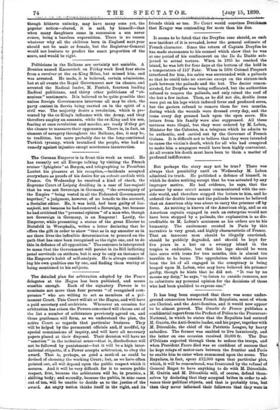Under the law decreed by the Emperor Paul, and aeted
on ever since, females cannot succeed to the Russian Throne until the line of his male descendants is exhausted. The three daughters of the Czar are therefore, for the present, barred, though there is no Salic Law, and the right of waiting in the magnificent but passive position of Czarevitch falls to the Emperor's brothers in succession. The eldest of these, the Grand Duke George, died on Tuesday in the Caucasus, —a vessel in his throat, weakened by tuberculosis, having suddenly burst. The Grand Duke Michael has therefore been acknowledged by Imperial decree as, for the present, heir to the Crown. He has no trace of his brother's disease, but he is not a strong man, and failing him the succession would belong to the Grand Duke Vladimir, brother of Alexander III., and reputed the ablest man in the Imperial family. The anxiety of the Emperor and Empress for a son, who would continue the succession in a direct line, is therefore intelligible; all the more because in Russia, even more than elsewhere, intrigues and hopes cluster round any heir wh,o is not also a son. The Emperor, however, though hitherto unlucky, may have many sons yet, the popular notion—shared, it is said, by himself—that when many daughters come in succession a son never comes, being a baseless superstition. There is no reason whatever why all the children born in England next year should not be male or female, but the Registrar-General would not hesitate to predict the exact proportion of the sexes, and would be right.







































 Previous page
Previous page